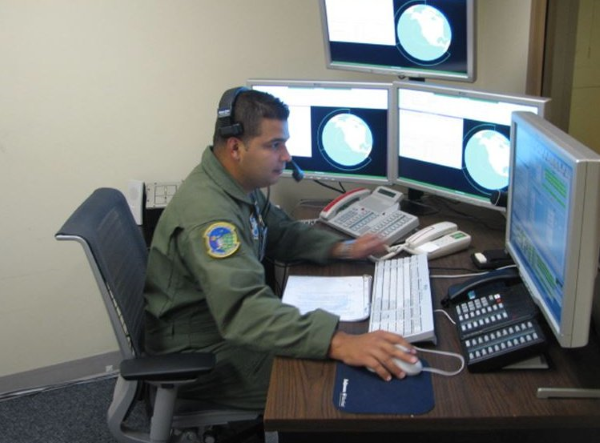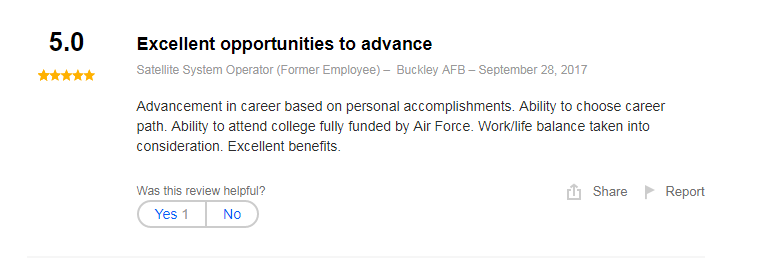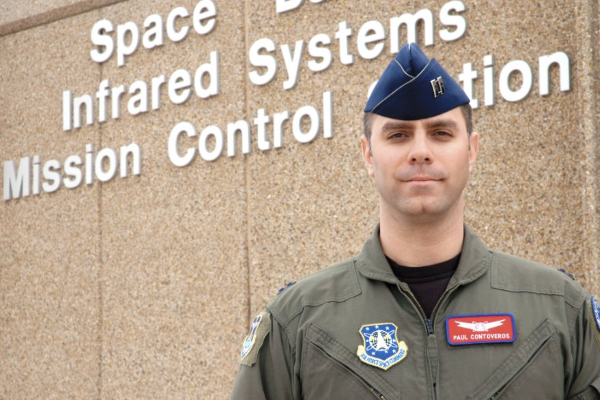Here is one of the most difficult, interesting, challenging, and rewarding jobs that an enlisted person can enter into in the Air Force.
Among the many duties that go along with this Air Force Space Systems Operations specialty are:
- Detect, identify and keep constant surveillance on other countries low orbiting and deep space satellite vehicles using a variety of available sensors
- Detect and track both incoming sea-launched and intercontinental ballistic missiles
- Act to safeguard friendly satellite communications and operate defensive and offensive space control systems to disrupt adversarial satellite communications
- Perform launch and on-orbit satellite command operations for military communications and Navistar Global Positioning System (GPS) satellites
- Assist in-flight hardware processing for DoD, NASA and commercial users
- Assist with command and control operations at such highly important facilities as the Combined Air and Space Operations Centers, Joint Space Operations Center, Advanced Missile Warning Center, National Reconnaissance Operations Center, and NORAD/USNORTHCOM Command Center
If a person makes it through technical training and serves well in this career field, they will have good employment opportunities waiting for them in the civilian world.
Related Article – How To Join The Space Force
Jump To A Section
Requirements and Qualifications
If someone truly wants to qualify for this Air Force Specialty they will have to have their act together in several areas.
This is one of the most difficult Air Force specialties to qualify for.
Here are the requirements and qualifications to be considered for this Air Force career field.
Educational Requirements
- High School Diploma
- GED
- GED with 15 college credits
ASVAB Requirements
- Minimum ASVAB Score of 70 in the electrical category
Additional Qualifications
- Be between the ages of 17 and 39
- Have normal color vision
- Be able to lift 40 lbs.
- Background knowledge of electronics is preferred but not required
- Successful completion of 8.5 weeks of Air Force Basic Military Training held at Joint Base Lackland San Antonio, TX (Not required of those with prior military experience or training)
- Will be subjected to a current national agency check and local agency and credit checks
- Must be able to attain a Top Secret security clearance after undergoing a Single Scope Background Investigation (SSBI)
Related Article: 41 Questions To Ask A Military Recruiter
Air Force Space Systems Operations Training and Career Path
Once an enlisted member has successfully completed all of the above requirements, they will then proceed to their designated Air Force technical training school.
Air Force Technical Training Information
All candidates wishing to become Air Force Space Systems Operations Specialist will proceed to Vandenberg AFB outside of the town of Lompoc, California.

This location is approximately 120 miles northwest of Los Angeles.
The Air Force technical training school that takes a little less than 4 months to complete.
There could be even more technical training involved depending on an Airman’s assigned specialty in this career field.
Once this training has been successfully completed, the enlisted member will then proceed to their next duty station for what will most likely be several weeks of on the job training.
An enlisted member will be made aware of their next duty station sometime during the 2nd or 3rd month of technical training.
Upon successful completion of their technical training course, an Airman will receive college credits toward a degree in Air and Space Operations Technology.
How Much Are Air Force Space Systems Operation Specialists Paid?
First off, just because this is a demanding Air Force career field does not mean it comes with extra pay incentives.
There can, however, be an increase in starting rank due to college credits and work experience.
These most likely will make the new recruit no higher than an Airman First Class (E-3).
So someone entering into a career as an Air Force Space Systems Operation Specialist can anticipate being somewhere between an Airman Basic (E-1) to Airman First Class (E-3).
These pay rates are set for all enlisted members by branches of the Federal Government.
The current pay rates for E-1 to E-3 pay slots with less than 2-years military experience are as follows:
| Rank | Pay (monthly) |
|---|---|
| Airman Basic (E-1) | $1,733 |
| Airman (E-2) | $1,942 |
| Airman First Class (E-3) | $2,043 |
This is considered what is to be take-home base pay.
Related Article: Air Force Ranks And Pay
Miscellaneous Pay, Benefits and Incentives
Other types of pay that someone in this career field may be eligible for are basic housing allowance (if living off base), food, temporary duty pay and pay adjustments for higher living cost areas.
One of the main benefits all Air Force personnel receive is 100% paid health care.
Pay increases are obtained with increases in rank or when base pay is raised by the government.
Increases in rank are earned based on both time served and by earned promotions.
Related Article – 10 Benefits Of Being A Military Wife (and 5 not-so good things);
What’s Life Like as an Air Force Space Systems Operations Specialist?

Compared to many other Air Force Specialties, life is pretty stable in peacetime for an Air Force Space Systems Operations Specialist.
The sophisticated equipment to do the job requires it to be placed predominantly at fixed sites.
Because of that, there is not an abundance of temporary duty assignments or assignments to remote locations.
Most of the duty stations are based in the continental USA too.
This makes it a good job for those Airmen that are married and have dependent children.
There are a limited number of overseas duty stations working with NATO allies and other strategic partners of America.
The chances of working late night or odd-hour shifts to fulfill the duties of this Air Force specialty are high.
Other than that, an Air Force Space Systems Operations Specialist will most likely lead a fairly normal life in peacetime.
This means that an Airman that works in this capacity in the Air Force will have opportunities to do such things as:
- Participate in squadron sponsored sports activities and use any available on base recreational facilities such as gyms and sports courts
- Bowling, Swimming and Golf facilities exist on many large Air Force Installations
- Take advantage of reduced price on base shopping facilities
- Have weekly days off and be eligible for 30-days paid leave each year
- Take college courses in their spare time to work toward an accredited degree
Air Force Space Systems Operations Job Reviews
A large number of people who have worked in this Air Force specialty have enjoyed their career and have had only good things to say about their experience.
Most that have done this work in the Air Force mention the opportunity for advancement in the Air Force and to gain meaningful civilian employment.
Here are a few reviews from former Air Force Space Systems Operations Specialists that have been posted on Indeed.com.


Without a doubt, in peacetime, there is no reason why an Air Force Space Systems Operations Specialist cannot have a well-rounded lifestyle.
Related Article – Dishonorable Discharge: Reasons, Consequences, And More
Air Force Space Systems Operations Civilian Career Opportunities
There are a wide variety of civilian jobs that can use the background skills acquired in this Air Force position.
The list keeps growing more and more too as 100’s of satellites are launched into orbit each year.
Keep in mind this list will only scratch the surface of the job opportunities in the civilian world that former Air Force Space Systems Operations Specialists will have.
Space systems operations is a growing field that is only at the beginning of what should be its rapid demand and growth in the civilian job market.
Aerospace, Defense, and Civilian Space Contractors
There are many civilian companies that have defense or satellite related jobs that can use the skills of a former Air Force Space Systems Operations Specialists.
The companies that are known to hire former Air Force Space Systems Operations Specialists include:
- Planet – San Francisco, CA
- Boeing Aerospace Company – Chicago, IL
- General Dynamics Corporation Falls – Church, VA
- Raytheon Company – Waltham, MA
- NASA – Washington, D.C.
- SpaceX – Hawthorne, CA
- Virgin Galactic – Mojave, CA
- American Satellite Corporation – Rockville, MD
- And many more
Radar and Sonar Technicians
Many former Air Force Space Systems Operations Specialists find work in radar and sonar-related career fields for companies like those listed below:
- Raytheon Space and Airborne Systems (SAS) – El Segundo, CA
- In-Depth Engineering Corporation – Syracuse, NY
- Air Combat Effectiveness Consulting Group – Lexington Park, MD
- Radiance Technologies Inc. – Dayton, OH
The list of companies with job openings for radar and sonar operators is long and very diverse.
Government and Civilian Jobs that Require a High-Security Clearance
Many enlisted members do not realize it but their secret and top secret level security clearances are a valuable commodity.
That clearance makes one eligible to be hired for many jobs that are not directly based on their Air Force Space Systems Operations background.
These include such employment opportunities as working for:
- The Department of Homeland Security – Washington, D.C.
- The Department of Defense – Washington, D.C.
- Defense Intelligence Agency – Washington, D.C.
- National Imagery and Mapping Agency (NIMA) – Springfield, Virginia
References:
Official Aviation Resource Management Page
Air Force Reserve Official Page
- 5 Worst Jobs in the Air Force - June 20, 2024
- 4 Steps For Visiting An Air Force Recruiter Near You - June 19, 2024
- Air Force Safety Specialist (1S0X1) - June 19, 2024




